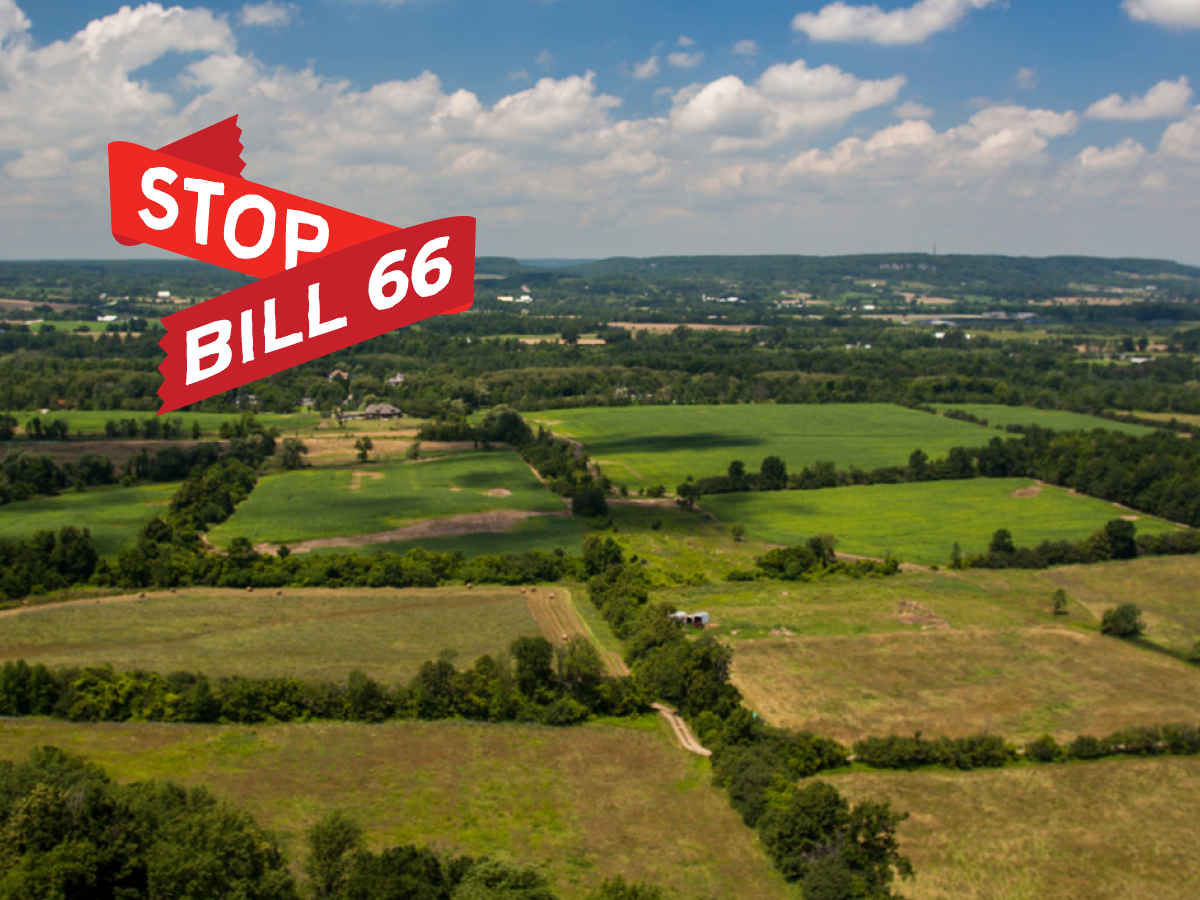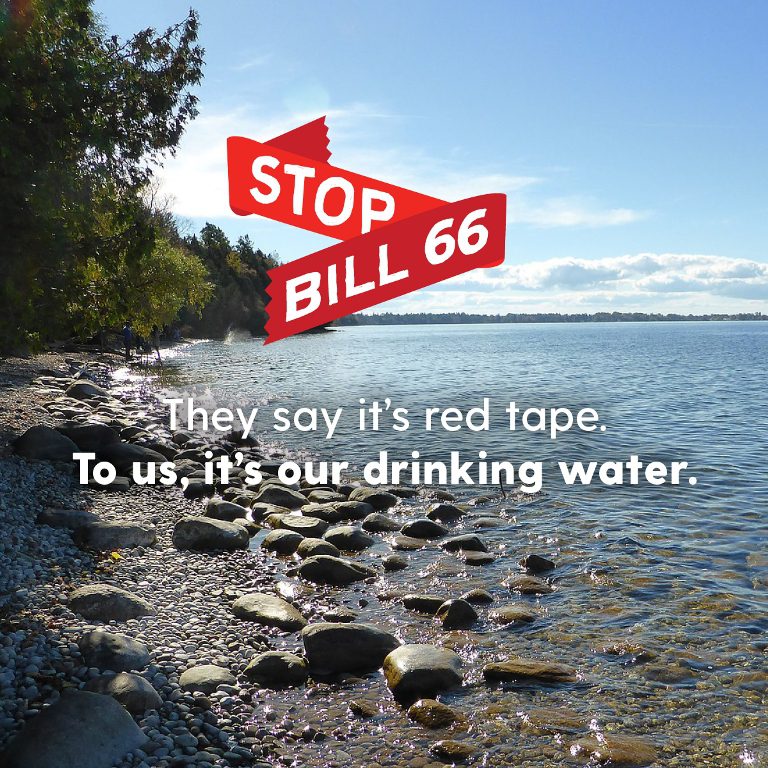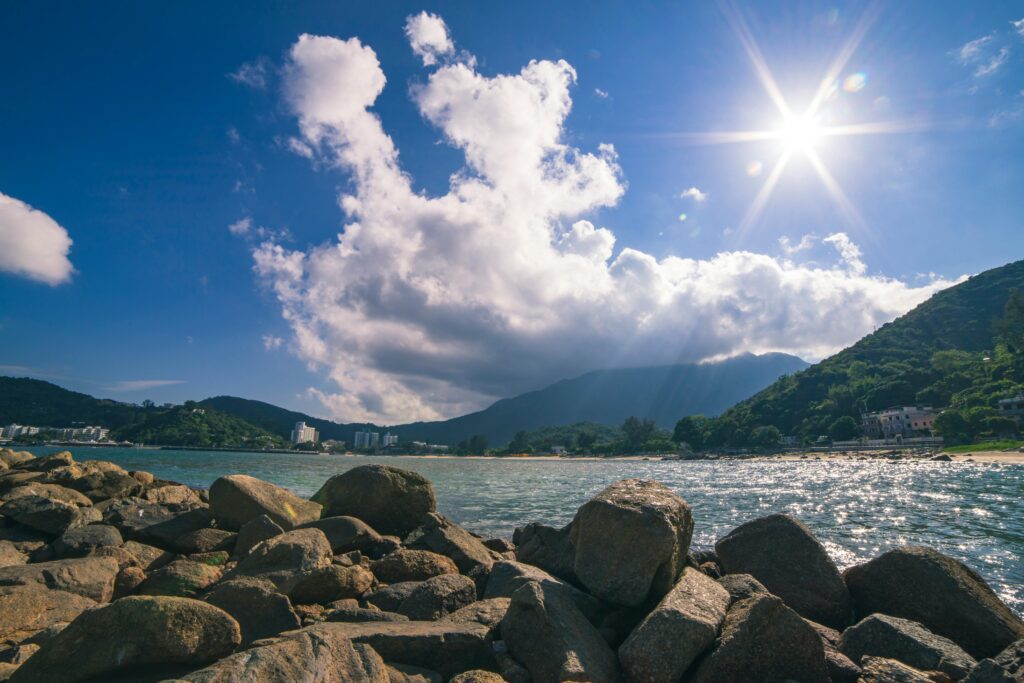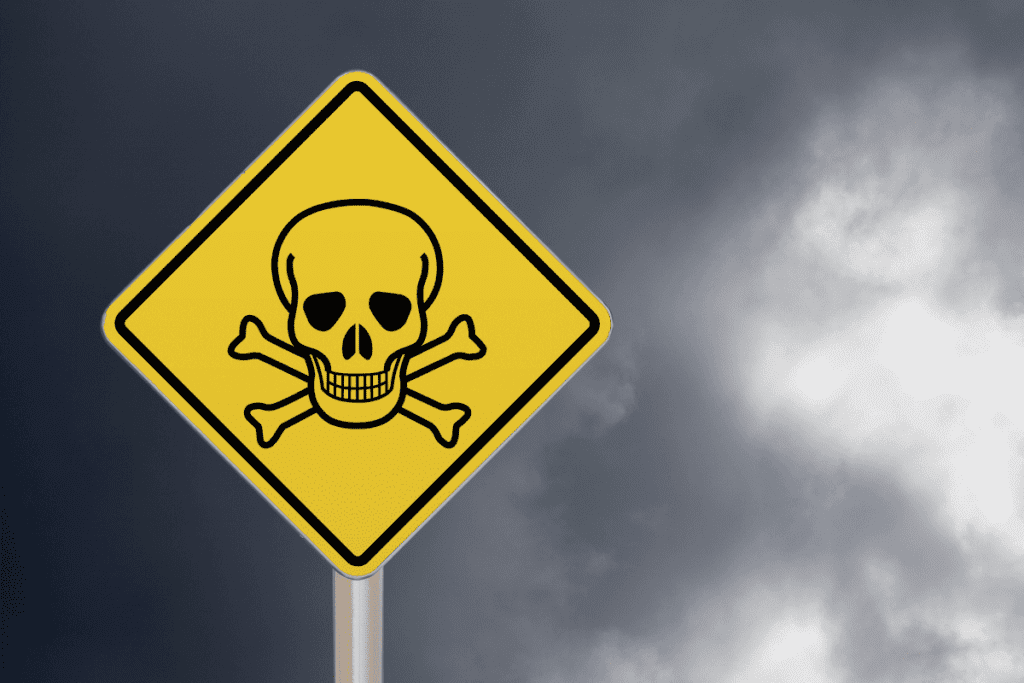Under the guise of creating jobs and cutting “red tape and burdensome regulations,” the provincial government introduced a bombshell of a bill last Thursday. Proposed Bill 66 will roll back many of the province’s fundamental water and environmental protection rules.
If dismantling Ontario’s cap-and-trade system, energy efficiency programs and the independent Office of the Environmental Commissioner of Ontario wasn’t enough, Bill 66 opens up Ontario’s Greenbelt for factory, retail and residential development, undermines drinking water protection rules and guts rules that help industry reduce the release of toxic chemicals. At a time when Ontarians need forward-thinking government action, Bill 66 basically takes us back 40 years.
Now more than ever, we need to come together to STOP BILL 66 in order to save the Greenbelt and defend our drinking water.
In this blog, we break down Bill 66’s three main threats to the province’s environmental legislation: the Greenbelt, clean water and protections from toxic chemicals.
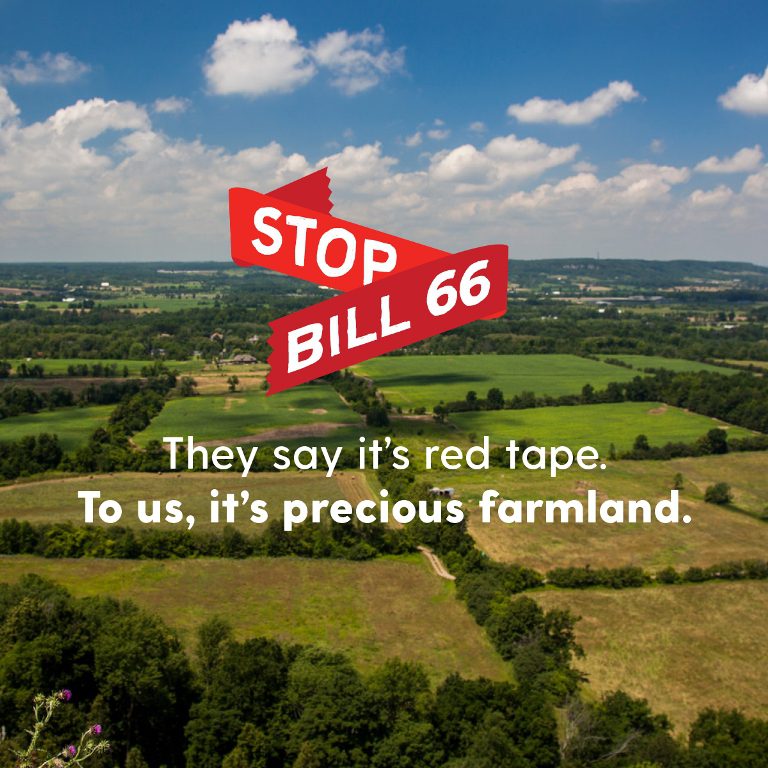
How Bill 66 will open up the Greenbelt for development
- The Greenbelt stops sprawl. If Bill 66 passes, we can expect more urban sprawl, higher property taxes, increased traffic congestion and more health-related illnesses due to air pollution.
We don’t need to develop the Greenbelt in order to have places to build new factories and homes. Government data shows that there is more than enough land designated for development within existing cities and towns to accommodate the expected population growth until 2041. And building houses on farmland in the Greenbelt doesn’t provide the affordable housing we need. Bill 66 also undermines the provincial housing consultation process underway by choosing to support sprawl over creating affordable housing in our cities and suburbs where there is access to transit, shops and servicing.
Bill 66 encourages land speculation whereby developers will be able to buy up farmland that is currently protected in the Greenbelt and apply for permits to turn it into factories or subdivisions. Speculation drives up the cost of land, making it out of reach for farmers, encourages the unnecessary expansion of expensive infrastructure to distant areas and results in higher taxes and housing few can afford. Building sprawling subdivisions or employment areas in the Greenbelt isn’t going to address housing affordability and there are few businesses that will want to locate in a farmfield without expensive sewage and water services.
- The Oak Ridges Moraine, a key part of the Greenbelt, is the rain barrel of south-central Ontario, providing drinking water for over 250,000 people. The moraine filters and stores water in aquifers for the future. It provides the base flow for rivers and streams flowing to Lake Ontario and Lake Simcoe. Development threatens the health of groundwater and puts our water sources at risk.
- The Greenbelt permanently protects farmland, forests and nature. Bill 66 opens up the Greenbelt to development putting our food security and natural areas at risk.
Since its inception 12 years ago, farmland in the Greenbelt has stopped disappearing and natural areas are protected. No farmland in the Greenbelt was lost to development between 2005-2014, however, 7,500 hectares of farmland in the GGH (outside of the Greenbelt) was lost to urban expansion. The Greenbelt provides certainty so farmers can plan to farm into the future.
Why this matters
Polls show that over 90 per cent of Ontario residents love the Greenbelt. And it’s no wonder, its productive farmland supports rural jobs, a strong agricultural business sector and provide local fruits and vegetables and food security. Its forests soothe us after a stressful week and clean our air. Its soils filter our water and absorb carbon pollution. And trails and parks throughout the Greenbelt provide opportunities for hiking, bird watching and family outings. Bill 66 puts the future of the Greenbelt and our quality of life at risk.
How Bill 66 threatens our lakes, rivers and our drinking water
- If passed, Bill 66 would allow developers to ignore protections for clean water across the province. This includes ignoring the Clean Water Act (CWA), which was an important law passed after the Walkerton tragedy that claimed seven lives due to drinking water contamination. After Walkerton, the CWA created source water protection plans to protect the places our drinking water comes from across Ontario. The CWA has helped Ontario’s drinking water become among the cleanest in the world, but Bill 66 threatens that, and could invite another well poisoning disaster like Walkerton.
- It won’t stop there, among the list of environmental protections Bill 66 attacks, it also rolls back important progress made on protecting Lake Simcoe. In the past, Lake Simcoe faced major threats such as pollution, invasive species and loss of natural areas. Ontarians, however, have taken action and the Lake Simcoe Protection Act was created to safeguard the watershed from further risk. In the last 10 years the Lake has begun to recover. Bill 66 would allow developers to ignore these plans and protections, which could threaten the important progress that we’ve made restoring Lake Simcoe.
- If that wasn’t enough, Bill 66 also sidelines the Great Lakes Protection Act, sending a message that lining the pockets of big developers is more important than the health of the Great Lakes. We rely on the Great Lakes: 98 per cent of Ontarians live in the basin and 80 per cent of us get our drinking water from them as well. Bill 66 has the potential to allow development in key areas which are protected for a reason, which could put them – and us – at significant risk.
Why this matters
If we’ve learned anything from the Walkerton tragedy, it is that protecting our water is key to protecting our health. Rolling back protections for our source water is a huge step in the wrong direction. There are plenty of places to develop businesses, factories and new homes; key water-protected areas are not one of them. We need to send that message to our MPPs to make sure they understand that water comes first. Ontario is a leader in safe drinking water, but Bill 66 could erase that progress, and put us back 40 years.
How Bill 66 undermines Ontarians’ health
- Bill 66 proposes to repeal the Toxics Reduction Act 2009 (TRA), a law that requires certain industrial facilities to consider ways to reduce the use and emissions of toxic chemicals in their operations. Ontario’s TRA is modeled after a successful 30-year old Massachusetts legislation that has helped industrial facilities significantly cut down their use of toxic chemicals such as cancer-causing substances and emissions into the environment.
At the core of the Ontario toxics reduction law is transparency and pollution prevention. The TRA requires that the public is informed about what chemicals industrial facilities are putting into our air, water and consumer goods, and how companies plan to update their practices and technology to reduce pollution. Sounds like a fair deal. But the chemical manufacturing industry has claimed that the TRA is too onerous and duplicates their reporting requirements under the federal Canadian Environmental Protection Act (CEPA).
In fact, the TRA fills a big gap in the federal toxics regulatory regime and offers a more flexible and effective way to reduce environmental pollution. For instance, between 1990 and 2004, Massachusetts reduced toxic chemical use in certain industrial sectors by 41 per cent and toxic waste by 65 per cent. The experience of Massachusetts shows that even though the implementation of reduction plans is voluntary, many companies achieve full or partial pollution reductions as set out in their plans over time.
Why this matters
Sadly, instead of supporting the goals of the TRA and bringing it to full implementation, the provincial government has opted for listening to some companies who want to continue to pollute without being held accountable. Premier Doug Ford has promised to “come down heavy” on polluters, but his government is instead proposing to give the green light to polluters and to undermine Ontarians’ right to live in a cleaner and safer environment.
What you can do to STOP BILL 66
- Sign the petition telling Premier Doug Ford and your MPP to save the Greenbelt, protect our water and keep us safe from toxic chemicals – www.stopbill66.ca
- Get a commitment from your MPP that they will not vote for Bill 66 and let us know what they are telling you.



